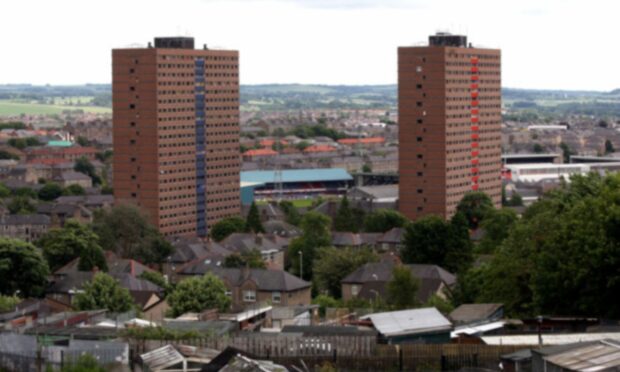Health Secretary Humza Yousaf revealed he and his wife have lodged complaints of racial discrimination over claims their two-year-old was unfairly rejected from a place at a Tayside nursery.
The couple say their daughter was refused a place, while other children with “non ethnic” names were offered spaces at the Little Scholars Nursery.
But just what can you do if you feel you’ve been racially discriminated against in some of the most important areas of your life like education, employment, healthcare and housing?
We discovered that the processes are cumbersome, time consuming and often expensive – which would likely have a direct and negative impact on the people most likely to face discrimination in the first place.
What is racial discrimination?
Race discrimination is when a person is treated unfairly because of their race, and can cover things such as colour, nationality, citizenship and a person’s ethnicity.
It is illegal in Scotland to racially discriminate against someone in their line of work, education, housing or when something is being carried out by a public body, such as the NHS.
Discrimination can be classed as ‘direct’ or ‘indirect’.
Direct discrimination is when someone is treated less favourably than someone else because of their race – for example, if someone is turned down for a job because of their race.
Indirect discrimination is where there is a rule, policy or practice which people from a particular racial group are less likely to meet, for example insisting someone has UK qualifications.

Reporting racism in schools and colleges
In education, it is illegal for both state and private schools and colleges to discriminate against someone on the basis of race – this covers admissions policies, treatment of pupils, exclusions and decisions about a pupil’s special educational needs or disabilities.
Schools also have a duty to protect pupils against racism from other pupils, both on school premises and on the way to and from school.
Initially complaints should be made to the school’s head teacher, however if this is not successful it can be taken to your local authority’s education department.
If this is still not successful, the racist incidents can then be reported to the police.
Racist incidents in school where a child is assaulted however, are criminal offences and police should be informed immediately.
If the incident relates to a college or university, you should use the institution’s own complaints procedure in the first instance – however if the college is funded by the Education and Skills Funding Agency, you can also complain to them.
If this is not successful, the complaint can be taken to the Scottish Public Service Ombudsman (SPSO).
When it came to Mr Yousaf’s grievance with a preschool nursery, he took his complaint to the Care Inspectorate – if he is not happy with the Care Inspectorate’s response, he can then take his complaint to the SPSO as well.

Tackling racism in the workplace
Procedures for dealing with racial discrimination in the workplace can cover all employers and employees, as well as agency workers, trainees and those who are self-employed.
It can cover issues in recruitment, promotion, training, pay and benefits, redundancy and dismissal, and the terms and conditions of work.
Initially complaints can be made directly to your employer, although you will need evidence such as the dates and times of incidents, and email and letter chains.
However if this does not resolve the problem, you can take the issue to an employment tribunal.
To make a claim you need to fill out a form online at Acas (the Advisory, Conciliation and Arbitration Service) or call them on 0300 123 1122.
At first Acas will try and reach an agreement with your employer, called ‘early conciliation’.
Early conciliation must start within three months less one day from the date of the thing you are complaining about (or six months less one day if it refers to statutory redundancy pay or equal pay).
Once the early conciliation is over, you will either get a ‘COT3 agreement’, which is a legal agreement both the employee and employer must stick to, or an ‘early conciliation certificate’ which allows you to go ahead and start an employment tribunal on the Acas website.
Once this has started a judge will look at the claim to see if it can be taken further, and will strike out any claims they don’t think will succeed.
If the claim is dropped you can ask for a review, but this will only work if you provide more evidence to make the judge change their mind.
A tribunal can make your employer pay compensation, recommend your employer do something, or make a statement saying your employer has discriminated against you – however the Citizens Advice Bureau advises employment tribunals can be “very stressful” and take a long time to resolve.

Taking action on racism in housing
Legal action can be taken if you are racially discriminated against when it comes to housing.
You can contact your landlord, local authority or housing provider in the first instance to make a complaint, but if this is not successful it can be taken to court.
It can be expensive to do this however, as there is a fee to lodge the claim with the courts, you need to pay to have the claim served on the other party, there are extra costs to cover during the case, solicitors’ fees, and the other side’s legal expenses if you lose.
If you are asking for compensation of up to £5,000 you can lodge a ‘simple procedure’ claim, which does not require a solicitor and will have less costs.
You can do this online via the Scottish Courts and Tribunal Service’s civil online portal.
If you cannot make the claim online you can complete a paper form at your local sheriff court, although you may need to outline why you are not able to do it online.
But if the claim is for more than £5,000 you will need to take ‘action under ordinary cause’, which involved lodging a writ costing £127 – this again can be done on the Scottish Courts and Tribunal Service website.
Complaints can also be sent to the SPSO if you are a tenant with a local authority or registered social landlord – although this service is free, often you need to provide evidence you have already complained directly to the landlord and received a response you deem to be unsatisfactory.

Being refused treatment or racism within a health or social care setting
Racism can also occur in healthcare settings, including being refused treatment, being given a lesser standard of treatment, or experiencing behaviour which you find distressing or offensive.
In the NHS you should first speak to a member of staff involved in your care, but if you don’t want to do this you can go directly to your health board’s feedback and complaints officer.
Most GP practices, dental surgeries, pharmacies and opticians will have their own complaints procedure and you should contact the practice or shop manager in the first instance – although you can ask your NHS board’s complaints team for help with this.
However if you are not happy with the response from any of these healthcare providers, you can take your complaint to the SPSO.
When it comes to residential care homes, racial discrimination can include being refused a place in a home, or neglect or abuse on the grounds of race.
Again you should follow the care home’s initial complaints procedure, or the local authority if the home is run by the council.
If these attempts to resolve the issue are unsuccessful, the complaint can be taken to the SPSO.
